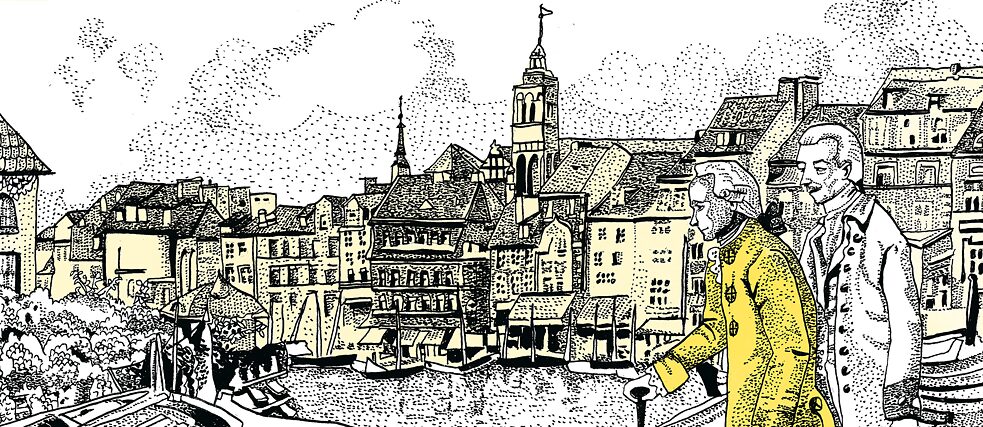Shoshana Liessmann
Commemorating Immanuel Kant

On the 300th anniversary of his birth, Immanuel Kant will be celebrated in 2024 as a revolutionary thinker and one of the most prominent philosophers of the Enlightenment. But at the same time, his philosophical cosmos and persona will also be under critical scrutiny. Shoshana Liessmann provides an overview.
Von Shoshona Liessmann
The philosopher Immanuel Kant was born in the East Prussian city of Königsberg on 22 April 1724. Kant came from a pietist family of craftsmen. He received an excellent education in his hometown, now the Russian city of Kaliningrad, enrolling at university at the age of 17. In 1755, he became a private tutor, teaching a range of subjects from logic, metaphysics, moral philosophy, mathematics, physics, geography, anthropology to pedagogy and natural theology. It was not until 1770, when he was 56 years old, that he was appointed professor of logic and metaphysics.
The Baltic port city of Königsberg, then a royal seat and capital of the Kingdom of Prussia, was characterised less by courtly life than by the middle classes, by trade and crafts. Although travel was regarded as a form of personal enlightenment in the 18th century, Kant himself rarely ventured outside the walls of his hometown. Indeed, his understanding of the world was based not on personal experiences but on perspectives presented in travel reports. It is surprising that this “armchair traveller” was interested in other planets and strongly believed in the possibility of extraterrestrial life.
Kant’s constitutional
Kant’s life story seems rather unremarkable when seen in isolation from his philosophical work. He is widely known for his strict adherence to a daily routine which included constitutional walks taken at exactly the same time every day. This rigid regime epitomises the unwavering discipline with which he dedicated himself to his three critiques: Critique of Pure Reason (1781), Critique of Practical Reason (1788) and Critique of Judgement (1790). These works are widely regarded as milestones in European philosophy.Dinner club
Kant is also known for his dinner club, which he founded in 1786. Throughout his life, Kant was not only a popular guest himself, he was also valued as a genial host, regularly inviting a large circle of guests to his table and thus cultivating conviviality and friendships. Educated women such as the respected Königsberg salonnière and artist Caroline von Keyserlingk, however, were noticeably absent from his guest list, even though Kant himself frequently attended the Keyserlingks’ “court of the muses”.Sapere aude!
In 1784, Kant published his famous essay “Answering to the Question: What is Enlightenment?” in the journal Berlinische Monatsschrift. The question had been posed somewhat casually in a footnote by another author a year earlier. Kant’s response offers a still valid definition of the Enlightenment and its motto: “Sapere aude! Have courage to use your own reason!” Living in an absolutist system, Kant called for the practice of critical thinking, advocating moral independence as a way of liberating one’s self from self-incurred immaturity.Kant and AI
Reason becomes the touchstone of knowledge, but at the same time it must acknowledge its own limitations. This raises questions that are still highly relevant today: What can I know? What ought I to do? What may I hope for? What is man? Kant offers us his concept of freedom, but this freedom only exists if the freedom of others is respected. Kant’s philosophical cosmos encompasses a number of issues that are of relevance today: his concept of the rights of world citizens resonates in the ongoing discussion surrounding migration policy, the question of knowledge has renewed significance in the age of digitalisation and his views on aesthetics take on new meaning when applied to AI-generated art.Critical scrutiny
Kant has consistently faced critical scrutiny, and for good reason. His overt racism, anti-Judaism and disparaging remarks about women have sparked more recent critical debate about the philosopher. Merely contextualising him historically as a product of his time is problematic since attitudes and viewpoints in this period were far from uniform. How is it possible that Kant – a man hailed as a pioneer of universal human rights – could develop such attitudes? There is evidence that Kant bequeathed around a third of his fortune to a Königsberg sugar refinery, despite the fact that his contemporaries rejected sugar as a colonial commodity because of its association with the slave trade and exploitation. It is not surprising that Kant has become a controversial figure and there are widespread calls for the decolonisation of European intellectual history.Scholarly investigations have revealed racist, anti-Jewish and sexist structures, while also uncovering inherent contradictions in Kant’s character. Despite being a pivotal figure of the Enlightenment, Kant himself did not fully embody its ideals. It is imperative that we adopt a self-reflective approach to this discourse so as to raise awareness of the ongoing legacy of discriminatory traditions of thought and to overcome these in the spirit of the Enlightenment.
Where to celebrate?
Preparations for the international Kant Society congress for the anniversary year of 2024 began back in 2016, with the event originally scheduled to take place in Kant’s hometown, now Kaliningrad. When Russia’s war of aggression against Ukraine began in February 2022, Kant was one of the philosophers to be most frequently quoted in connection with this war – not least because of his famous 1795 treatise Perpetual Peace. Kant’s moral and philosophical reflections on how enduring peace could be preserved among nations also left an imprint on the United Nations Charter 150 years later. A decision was eventually made to relocate the congress to Bonn. Under a different premise, however, a separate Kant congress is also being held in Kaliningrad, raising the important question about the appropriation of philosophers.In recent years, interest in philosophy appears to have increased in Germany, with a focus on the fundamental questions of human existence and behaviour. Perhaps this trend is also driven by our need to engage in philosophical reflection on the multiple crises, polarisations and challenges of our time.